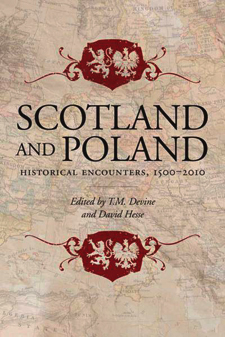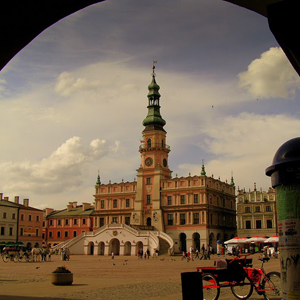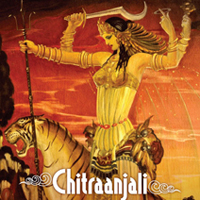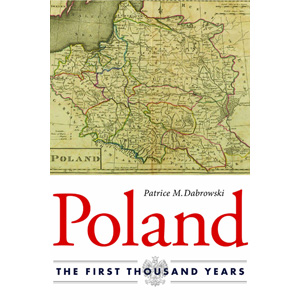 Scotland and Poland: Historical Encounters, 1500-2010
Scotland and Poland: Historical Encounters, 1500-2010
Edited by T.M. Devine and David Hess
Birlinn Ltd, 2011
Scotland and Poland, Historical Encounters, 1500-2010, a book inspired by a groundbreaking conference hosted by the University of Edinburgh in October 2009, presents, for the first time in one volume, a survey of Scottish-Polish relations over a period spanning half a millennium. Organized in cooperation with the Polish Cultural Institute in London and the Consulate General of the Republic of Poland in Edinburgh, the conference brought together scholars from Scotland, England, Australia and Poland, all of them specialists in the little-known area of Scottish-Polish relations.
The opening paper was presented by the well-known journalist and highly regarded authority on Poland, and one can say also a great friend of Poland, Neal Ascherson, who began by paying homage to a man he considers a symbol of the Scottish-Polish relationship: General Stanisław Maczek, a great soldier and liberator of cities in France and Holland. As already noted, most Scots knew nothing about Poland in 1940 but they can be forgiven for being parochial at a time when few people travelled beyond their parishes. Still, one didn’t expect this from someone of the rank of Field-Marshall Montgomery who, upon meeting General Maczek in 1940, asked him: “Tell me, what language do Poles really speak among themselves at home – German or Russian?”
Amusing as that is, Scotland and Poland has a much bigger story to tell and Professor Ascherson leads with a marvelous overview of the Scottish settlers in Poland that might have numbered 30,000 or more, though the precise number can’t be determined. Indeed, it was noted that when the English parliament was debating union with Scotland (1707), those not in favour pointed to Poland as a warning: “If we admit them into our liberties we shall be overrun with them… witness the multiplicities of the Scots in Poland.”
At a time when Europe was engulfed in religious strife, the uniquely tolerant Polish-Lithuanian Commonwealth accepted the Scots, whatever their religion, since both Catholics and Protestants had, at various times, good reason to get away from bigotry and violence in their homeland. Treated well by the Crown, they were largely successful merchants and bankers, one of them, Alexander Chalmers (Czamer), a four-term mayor of Warsaw, another, William Bruce, a professor of Roman Law at the new university at Zamość. Bruce and others, notably Patrick Gordon, an associate of Jerzy Sebastian Lubomirski, wrote well-informed and detailed accounts of Polish politics. The Scots established well organized settlements, divided into twelve “Scottish Brotherhoods” each with elected elders who came together annually in Toruń. At times there was friction, as in one deadly act of anti-Scot violence in Toruń, but the Crown defended the Protestant minority.
This period of Scottish emigration is also important in the history of the Scottish diaspora since it was during the Polish phase that the Scots developed their “specific model of emigration of small patriarchal units usually recruited through family connections.” This “enlightened nepotism” eventually developed into private partnerships that spread across the British Empire in the 18th and 19th centuries and survived into the giant private trading companies such as Guthries and Jardine Matheson. Scottish emigrants also ploughed their profits back into the local economies, in Poland, for example, investing heavily in linen factories.
The section by Robert Frost, a professor at the University of Aberdeen, is particularly interesting in that he not only discusses the Commonwealth but also the lack of interest, misunderstanding and even disinformation about it despite the very real parallels between Polish and Scottish political history. The Counter-reformation in Poland led by the Jesuits dimmed the Scots’ interest in Polish religious traditions including its record of toleration, and “from the early seventeenth century, Poland was classed among the Catholic powers, and linked therefore to a stereotype of absolute monarchy and arbitrary power, despite the fact that the Catholic hierarchy in Poland, while broadly monarchical in its sympathies, was by no means a supporter of absolute royal power; ironically Catholic Poland-Lithuania had remained true to the Roman republican and Ciceronian tradition that had so influenced Scottish Calvinist political discourse in the sixteenth century.”
Waldemar Kowalski, professor of history at the Jan Kochanowski University in Kielce, discusses the reasons for Scottish emigration and also their reception in Poland, which, he says, was not always welcoming. Immigration history is replete with accounts of prejudice, contempt for the poor (the peddlers with packs on their backs) and resentment of the successful (the bankers and wealthy merchants), especially when religious differences could be exploited.
In a second paper by Professor Frost, comparing the rural economies of the Scottish Highlands and the Polish-Lithuanian Commonwealth, he challenges the black and white legends that have dominated western views of the two countries. With the disappearance of the Polish state under the partitions, few scholars studied Polish political and social history creating a vacuum easily filled by ill-informed statements often in the service of the established powers. The long period of Soviet domination after WWII imposed a strong grip of censorship over this already neglected subject. The fall of communism finally liberated Polish historians from paying lip service to the simplistic views so long impeding independent research. There is a renewed interest in this field.
With each paper, Scotland and Poland provides a new dimension, a new insight and a new perspective, served up by an impressive group of historians gathered in Edinburgh for this conference.
Subjects covered include a Scottish diplomat representing England; women in a Scottish Reformed Parish in Cracow (Agnes Burnet: Agnieszka Bornatowa, Ursula Elmslie: Emslowa, Anna Hewison: Huison); wealthy family networks and ennobled Scots: a rich and colourful pageant.
As the papers move on to more recent history, it returns to the heroism and the horror of the war, the loss of home, and the change in attitudes as soldiers become workers in need of jobs. There are religious tensions: most Poles are Catholics, most Scots are not. There is the emotional impact of Yalta and Potsdam, followed by the UK Labour Government’s and the unions’ vilification of their former allies along with blind admiration of the Soviet Union, Gulag and all.
But in the end, the Poles who stayed did well and came to love Scotland and Scots accepted them, no doubt a good thing for the most recent arrivals in this century. A survey of media attention to the new immigrants paints largely a positive picture, celebrating the Poles for helping with two specific issues: population decline and a skills shortage. In the 1940s, the press urged England to take a greater share of the Polish exiles; this time the press urges the Poles to choose Scotland over England. But the media is fickle, so the report suggests the media be observed “through a wary lens.”
Contributors to Scotland and Poland include Alan Carswell, an authority on British Military history; Rachel Clements of Newcastle University; T.M. Devine, a professor of Scottish history and Director of the Scottish Centre of Diaspora Studies; David Hesse of the University of Edinburgh, Anna Kalinowska of the Institute of History, Polish Academy of Science in Warsaw; Peter Stachura of the University of Stirling; David Worthington from the UHI Millennium Institute, soon to be the University of the Highlands and the Islands; and Aleksander Dietkow from the Ministry of Foreign Affairs in Poland.
Scotland and Poland is so fresh, new and invigorating that it’s a must for every university library – and a pleasure for anyone interested in history, Polish, Scottish or just diaspora history. What a conference it must have been. A model, one hopes, for similar ventures perhaps? What a pleasure it would be to have several sessions at a PIASA conference on Poles and Tatars, Poles and Armenians, Poles and Italy… and, of course, Poles and Scots.
CR




Pingback: Scotland and Poland: for Auld Lang Syne